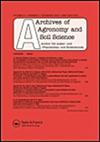Changes in salinity, aggregates and physicomechanical quality induced by biochar application to coastal soil
IF 1.8
4区 农林科学
Q1 AGRONOMY
引用次数: 0
Abstract
ABSTRACT Coastal clayey soil has a great potential for food production and safety while poor physico-mechanical properties have impeded its sustainable utilization. A field experiment was conducted to assess the influence of biochar on physicomechanical properties of coastal clayey soil. The biochars were applied to the coastal soil with the rate of 0, 1%, and 3% (w/w), respectively. Compared with control treatment, the application of three biochars (at the rate of 3%) had significantly improved soil fertility, i.e. organic carbon, total nitrogen, available nitrogen and available phosphate, respectively. Biochar treatments significantly increased soil porosity, and aggregates stability, while reduced the soil salinity compared to the control treatment. Meanwhile, biochar application significantly increased the plastic index of coastal clayey soil while decreased soil tensile strength and shrink swell properties compared to the control. Biochar clearly altered soil pore characteristics, consequently rebuilding the new ions leaching channels. Overall, the cow manure biochar (650 °C) at the rate of 3% treatment showed maximum efficiency on soil salinity, fertility, physicomechanical properties, and crop yield. The biochar amendment improved coastal soil by ameliorating soil pore space and structure, improving soil tillage operation and rice yield, decreasing salt stress, and reducing mechanical strength.施用生物炭对沿海土壤盐分、团聚体和物理力学质量的影响
沿海粘性土在食品生产和安全方面具有巨大的潜力,但其物理力学性能较差,阻碍了其可持续利用。通过田间试验,评价了生物炭对滨海粘性土物理力学性质的影响。将生物炭分别以0%、1%和3%(w/w)的比例施用于沿海土壤。与对照处理相比,三种生物炭(3%)的施用显著提高了土壤肥力,即有机碳、总氮、有效氮和有效磷。与对照处理相比,生物炭处理显著增加了土壤孔隙度和团聚体稳定性,同时降低了土壤盐度。同时,与对照相比,施用生物炭显著提高了沿海粘性土的塑性指数,同时降低了土壤的抗拉强度和收缩膨胀特性。生物炭明显改变了土壤孔隙特征,从而重建了新的离子浸出通道。总体而言,牛粪生物炭(650°C)在3%的处理率下对土壤盐度、肥力、物理力学性能和作物产量表现出最大的效率。生物炭改良剂通过改善土壤孔隙空间和结构、改善土壤耕作操作和水稻产量、降低盐胁迫和降低机械强度来改善沿海土壤。
本文章由计算机程序翻译,如有差异,请以英文原文为准。
求助全文
约1分钟内获得全文
求助全文
来源期刊

Archives of Agronomy and Soil Science
AGRONOMY-SOIL SCIENCE
CiteScore
5.50
自引率
4.20%
发文量
107
期刊介绍:
rchives of Agronomy and Soil Science is a well-established journal that has been in publication for over fifty years. The Journal publishes papers over the entire range of agronomy and soil science. Manuscripts involved in developing and testing hypotheses to understand casual relationships in the following areas:
plant nutrition
fertilizers
manure
soil tillage
soil biotechnology and ecophysiology
amelioration
irrigation and drainage
plant production on arable and grass land
agroclimatology
landscape formation and environmental management in rural regions
management of natural and created wetland ecosystems
bio-geochemical processes
soil-plant-microbe interactions and rhizosphere processes
soil morphology, classification, monitoring, heterogeneity and scales
reuse of waste waters and biosolids of agri-industrial origin in soil are especially encouraged.
As well as original contributions, the Journal also publishes current reviews.
 求助内容:
求助内容: 应助结果提醒方式:
应助结果提醒方式:


